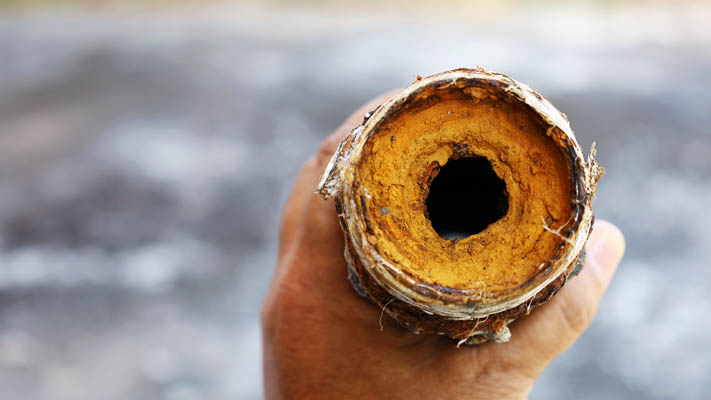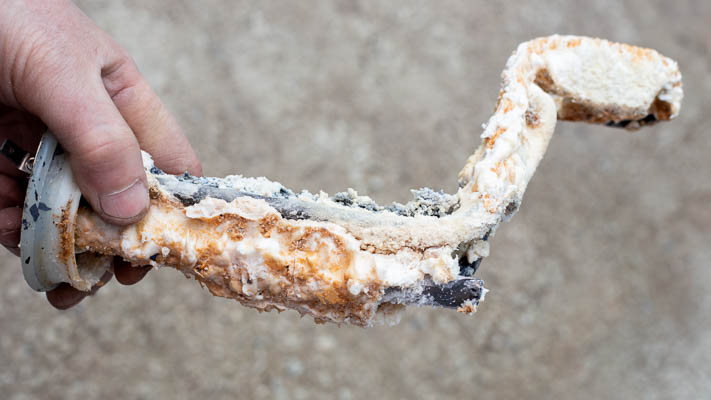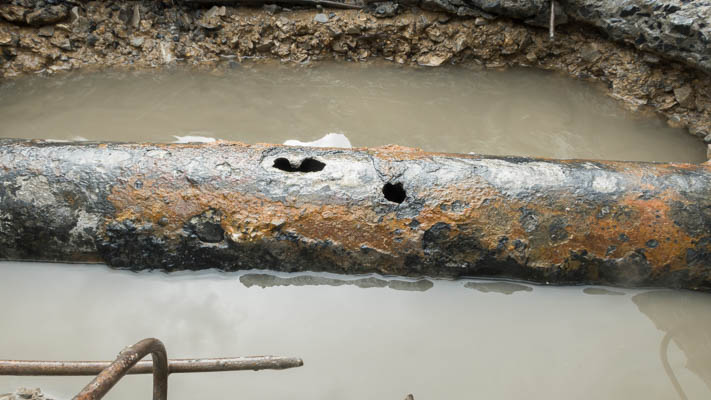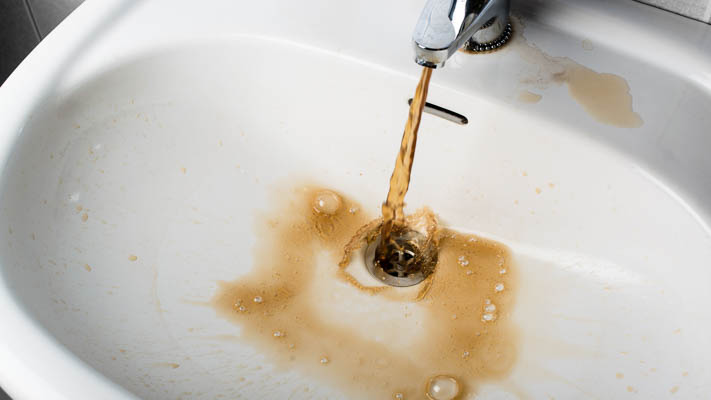How Does Rust Get In My Drinking Water?
Rust can enter your drinking water from a variety of sources—both inside and outside your home. Here are the most common ways it happens:
- Natural chemistry: Rust is the common term for red iron oxide, which forms when iron reacts with oxygen and water (a naturally occuring process). In areas with hard water, the minerals can accelerate rust formation and buildup, making the problem worse.
- Well water from mineral-rich soil: If your home uses a well system, the groundwater may already contain iron oxide from the surrounding earth.
- Municipal water supply issues: Rust may be present in city water due to either the original water source or corrosion within the municipal distribution system.
- Old galvanized pipes inside the home: Galvanized steel pipes are prone to internal corrosion over time, introducing rust directly into your home's water.
- Old hot water heaters: Ageing water heater tanks often corrode internally, especially if the sacrificial anode has been depleted, releasing rust into your hot water supply.

Identifying where the rust is coming from is the first step toward restoring clean, clear water in your home.
How To Remove Rust From My Drinking Water
Rusty drinking water is generally not considered hazardous to your health. However, it can stain clothes, sinks, and showers, often giving your water an unpleasant metallic taste. Below are common sources of rust in drinking water and how to remove it effectively:
1. Rusty Well Water or Municipal Supply Water
If your water is already rusty before it reaches your home's plumbing system, the most effective solution is to install a whole-home filtration system. These systems are typically installed near the point where water enters your home.
A wide range of water filtration systems is available. Many can be customized to remove iron oxide (rust), along with other contaminants like sediment, chlorine, and industrial chemicals.
2. Rusty Hot Water Heater Tanks
Hot water heater tanks typically last 8 to 12 years. These tanks contain several internal components made of steel, including the tank itself.
New water heaters are fitted with a sacrificial anode rod (usually made of magnesium or aluminum). This anode attracts corrosive elements in the water and protects the tank's steel components. Once the anode is fully depleted, corrosion accelerates, and the tank begins to rust.

Regular maintenance (such as flushing the tank and replacing the anode rod) can extend your water heater's lifespan. But once you start seeing discolored or rusty water, it's usually time to replace the unit. Beyond the discoloration, the greater risk is tank failure, which can cause leaks or water damage.
3. Galvanized Plumbing That Has Rusted Internally
If your home still has galvanized plumbing, it's very likely that internal rust has developed over time.
Internal rust doesn't just cause your water to taste metallic, it also reduces water pressure, clogs pipes, and thins the pipe walls. This increases the risk of pipe failure and hidden leaks, especially under slabs or behind walls.

Unfortunately, there is no long-term fix for rusty galvanized pipes other than replacing them. We've written several helpful guides on this topic:
- How to identify galvanized plumbing
- How long do galvanized pipes last?
- Repair vs. repipe: which is more cost-effective?
As explained in the third article above, replacing your galvanized plumbing piecemeal over time can end up being more expensive (and more disruptive) than doing a full repipe all at once. Get a free quote to replace your galvanized pipes.
Get A Quote To Replace Rusty Galvanized Pipes
Here at Repipe Specialists, we've fully replaced galvanized plumbing in thousands of homes across the USA using modern Uponor PEX-A tubing and American-made Type L copper pipe, effectively stopping rust in your drinking water at the source. We consistently receive positive feedback from homeowners about their whole-home repipe experience. In many cases, we exceed expectations when it comes to:
- Speed: Our repipe crews typically complete a repipe in a day, returning on another day for wall patching.
- Convenience: Through our One-Stop Repipe™ Process, we handle everything from permits, to wall patching, to inspections.
- Cleanliness: Our crews are trained to protect your home while working (we cover all surfaces with protective sheeting), and to clean up fully at the end of each day.
- Peace of Mind: Repipe Specialists is a fully licensed plumber in every state we operate in, and we back all of our repipes with a lifetime warranty.
- Financing programs: To help take the sting out of unplanned repipe expenses, we offer several financing programs.
- Price: As a specialist that performs hundreds of repipes a week, we can deliver high-quality repipes at a lower cost vs generalist plumbers. We have an article that covers repipe cost factors in detail. Our quotes typically range from $4,500 to $15,000 depending on the size and complexity of your project.
Schedule a free in-home consult, and a local estimator will explain all your repipe options and provide you with a written, fixed price quote. Replace your galvanized pipes and enjoy clean, rust-free drinking water.

